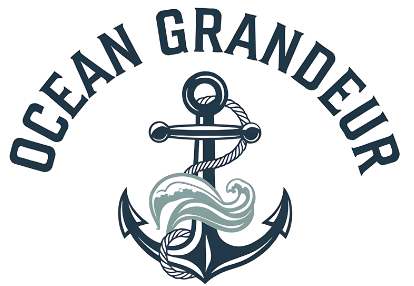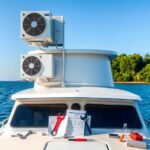Table of Contents
The gentle rocking of waves used to mean complete disconnection from the world. But today, my floating home is a mix of maritime adventure and modern connectivity.
Living on a houseboat doesn’t mean giving up communication—it means finding creative ways with marine wifi and mobile hotspots.

I moved from traditional living to a water-based lifestyle, and I know how important staying connected is. Internet and phone access on houseboats is not just a luxury—it’s a must for work, safety, and keeping in touch with loved ones. Whether you work remotely, travel digitally, or enjoy weekend adventures, staying in touch is essential.
My experience showed that satellite internet and cellular boosters can change how you communicate at sea. With the right planning and technology, you can have smooth connectivity while enjoying the freedom of houseboat life.
Key Takeaways
- Connectivity is possible on houseboats with proper equipment
- Multiple communication technologies exist for marine environments
- Strategic planning is key for reliable internet access
- Cellular boosters can greatly improve signal strength
- Backup communication systems are vital for safety
Understanding Marine Connectivity Challenges
Living on a houseboat comes with unique communication challenges. These are different from what most people face on land. To stay connected, you need to grasp the complex world of marine communication systems.
Getting internet on a boat isn’t easy like setting it up at home. Marine environments pose special hurdles for signals, including cellular boosters, marine radios, and internet access.
Common Signal Interference Sources on Water
- Metal boat structures disrupting wireless signals
- Electromagnetic interference from navigation equipment
- Water’s reflective properties causing signal distortion
- Physical obstructions like islands and coastlines
Distance from Shore Impact on Connectivity
The farther you are from shore, the weaker your signal gets. VoIP phone services and internet cafes near marinas become essential for staying in touch.
| Distance from Shore | Signal Strength | Communication Options |
|---|---|---|
| 0-5 miles | Strong | Cellular, WiFi |
| 5-20 miles | Moderate | Satellite, Marine Radio |
| 20+ miles | Weak | Satellite Communication |
Weather Effects on Signal Quality
Weather greatly affects how well you can communicate. Storms, fog, and changes in atmospheric pressure can mess with wireless signals.
*Preparation is key to maintaining reliable communication in unpredictable marine environments.*
Knowing these challenges helps houseboat dwellers create strong communication plans. These plans keep them connected, no matter where they are on the water.
Essential Equipment for Houseboat Internet Access
Staying connected on the water needs careful planning and the right gear. As a houseboat fan, I’ve found key equipment for reliable internet on the water.
Portable wifi routers are a top pick for houseboat internet. They’re small, versatile, and create wireless networks in remote areas.
- Portable WiFi Routers: Lightweight and adaptable for marine use
- Marine WiFi Routers: Specialized waterproof networking devices
- Cellular Signal Boosters: Enhance weak maritime communication signals
- Satellite Internet for Boats: Long-range connectivity solution
Satellite internet for boats is the strongest option for long trips. It works without cell networks, giving steady internet over big areas.
“The right equipment can transform your houseboat from an isolated vessel to a connected floating home.” – Maritime Technology Expert
Choosing marine gear? Look at signal strength, durability, and how it fits your boating needs. Waterproof and strong signal are key for good internet on the water.
Good marine wifi routers and boosters make a big difference. They keep you connected to the world while you enjoy the water.
Tips for Staying Connected on Houseboats: Internet and Phone Access
Staying connected on a houseboat needs careful planning and the right tools. Houseboat owners face special challenges. But with the right steps, you can keep in touch and online.
Planning Your Connectivity Setup
Having a solid communication plan is key for houseboat life. It’s wise to have several ways to stay connected. Here are some important points to consider:
- Choose multiple cellular signal boosters for better coverage
- Look for marina wifi access points on your usual path
- Think about hybrid communication systems
- Check out different hotspot devices
Backup Solutions for Emergency Situations
Having reliable communication is vital in emergencies. Having backup plans means you’re always connected:
| Backup Method | Reliability | Coverage |
|---|---|---|
| Satellite Phone | High | Global |
| Emergency Radio | Medium | Regional |
| Offshore Cellular Booster | High | Coastal |
Cost-Effective Connection Strategies
Managing your connection costs is important. Here are ways to save money without sacrificing quality:
- Compare prepaid mobile data plans
- Use wifi-first communication apps
- Get flexible marina wifi access packages
- Invest in multi-carrier signal boosters
“Connectivity is not a luxury, but a necessity for modern maritime living.” – Maritime Technology Expert
By using these tips, houseboat owners can build a strong communication network. It’s all about being flexible, prepared, and choosing the right technology.
Marine WiFi Solutions and Installation Guide
Exploring maritime communication systems is key for houseboat lovers. The right long-range wireless networking setup is vital for staying connected at sea.
Choosing the right marine wi-fi system is important. You need to think about:
- Signal strength and range capabilities
- Weather resistance
- Compatibility with existing marine electronics
- Power consumption
When setting up satellite internet, where you place your antenna matters a lot. I suggest putting it in a spot with no blockages for the best signal.
“The key to successful maritime communication systems is strategic placement and quality equipment.” – Marine Connectivity Experts
Here’s a detailed look at marine wi-fi options:
| WiFi Solution | Range | Power Requirements | Price Range |
|---|---|---|---|
| Coastal Booster | 5-10 miles | 12V DC | $200-$500 |
| Long-Range Marine Router | 15-25 miles | 24V DC | $500-$1000 |
| Offshore WiFi System | 30-50 miles | 48V DC | $1000-$2500 |
Getting a pro to install might seem pricey. But it’s worth it for top performance and to avoid damage to your marine gear. Always talk to a marine communication expert to find the best solution for you.
Cellular Boosters and Signal Enhancement Technology
Marine internet connectivity is a big challenge. Waterproof electronics have changed how we stay connected at sea. They help us find the best offshore wifi solutions.
Today’s mobile hotspots for boats use top-notch cellular boosting. This tech makes communication much better in the water.
Types of Marine-Grade Cellular Boosters
There are many important options for marine cellular boosters:
- Fixed-mount marine boosters
- Portable marine signal amplifiers
- Multi-carrier signal enhancement systems
- Waterproof external antenna boosters
Optimal Antenna Placement Tips
Putting antennas in the right spot can really help. Here are some tips:
- Mount antennas as high as you can
- Make sure they have a clear view of towers
- Use waterproof marine-grade mounts
- Keep cables short between antenna and booster
Coverage Range Expectations
| Booster Type | Typical Range | Signal Improvement |
|---|---|---|
| Basic Marine Booster | 1-2 miles offshore | 2-3 bars increase |
| Advanced Marine Booster | 3-5 miles offshore | 4-5 bars increase |
| Professional Marine System | 5-8 miles offshore | Full signal strength |
Choosing the right cellular booster makes a big difference. It ensures you stay connected on the water.
“The sea may be vast, but communication doesn’t have to be limited” – Marine Technology Experts
Satellite Internet Options for Houseboats
Navigating the vast waters demands reliable internet connectivity. Satellite communication for houseboats has changed how boaters stay connected. I’ll explain the key satellite internet solutions for seamless connectivity on the water.

When traditional cellular networks fail, satellite internet is a lifeline for houseboat enthusiasts. The key is choosing the right service for reliable internet at sea.
- HughesNet Marine: Offers dedicated maritime satellite solutions
- Viasat Marine: Provides high-speed internet for offshore locations
- KVH TracNet: Specialized marine satellite communication systems
Choosing a satellite internet provider involves considering several critical factors:
- Coverage area: Ensure global or regional coverage matches your travel plans
- Data speeds: Compare bandwidth options for streaming and communication
- Equipment costs: Evaluate initial installation and ongoing maintenance expenses
“Satellite technology bridges the communication gap between land and sea, transforming how we experience maritime connectivity.” – Marine Technology Expert
Houseboat phone service options have expanded dramatically with satellite communication. Modern systems allow for crystal-clear voice calls, video chats, and emergency communications from virtually anywhere on the water.
When planning your satellite internet setup, budget between $2,000 to $5,000 for professional installation and equipment. Monthly service plans typically range from $100 to $500, depending on data requirements and coverage.
Phone Service Solutions for Life on Water
Living on a houseboat means facing unique challenges for staying connected. Modern tech has changed how we keep in touch while at sea. Now, there are many ways to stay connected, no matter where you are.
Getting reliable phone service at sea needs careful planning. Knowing the right tech can make sure you stay connected, no matter where you are.
VoIP Services for Maritime Use
Choosing the right Voice over Internet Protocol (VoIP) service is key for boaters. These systems offer flexible ways to communicate:
- WhatsApp for international messaging
- Skype for video calls
- Zoom for group communications
- Marine-specific communication apps
Emergency Communication Systems
When living on water, safety is always first. Having strong emergency communication systems can save lives in emergencies.
| Communication Device | Range | Reliability |
|---|---|---|
| Marine Radio | 20-25 nautical miles | High |
| Satellite Phone | Global | Very High |
| Personal Locator Beacon | Global | Extreme |
International Calling Considerations
Exploring international waters means you need to know your calling options. Satellite communication is a top choice for staying connected worldwide.
“Preparation is the key to successful maritime communication” – Marine Communication Experts
Think about getting international calling plans or using wifi hotspots to save money. Look into local cell providers and roaming options to avoid surprise bills.
Marina WiFi Networks and Hotspot Access

For houseboat owners, finding reliable internet can be tough. Marina WiFi networks are a good option, but knowing how they work is key.
Marina hotspots have their ups and downs. Marine wireless routers can boost signals, but they come with their own set of problems.
- Check the marina’s WiFi setup before using it
- Get boat antenna installations for better signal
- Use signal boosters for stronger connections
“Connectivity at sea is less about perfect signal and more about strategic solutions.” – Marine Technology Expert
Here’s what I suggest:
| Connectivity Method | Pros | Cons |
|---|---|---|
| Marina WiFi | Free, Convenient | Limited Range, Unstable |
| Cellular Booster | Wider Coverage | Dependent on Cell Signal |
| Satellite Internet | Global Coverage | Higher Cost |
Pro tip: Always have backup communication methods when relying on marina WiFi networks.
Security is very important when using public hotspots. Use VPNs, avoid sensitive transactions, and be careful with open networks. This helps keep your digital life safe while you’re out on the water.
Conclusion
Staying connected on a houseboat needs careful planning and the right tech. Offshore communication has changed a lot, giving boat owners many ways to stay in touch. Cellular boosters are key for bridging the gap between land and sea.
Looking into maritime hotspots and tech shows no one solution works for everyone. The right mix of internet and phone access depends on your travel, budget, and needs. You might pick satellite internet, marine WiFi, or cell signal boosters, based on what you need.
Good communication tech makes houseboat life better, not isolated. Modern systems let you work from anywhere, keep in touch with family, and get help when needed. The trick is to find a plan that works in different sea conditions.
As tech gets better, so will options for houseboat communication. Keep up with new tech and the challenges of staying connected at sea. This way, you can always stay in touch with the world.
FAQ
What are the best internet options for houseboats?
For houseboats, top internet choices are mobile hotspots, satellite internet, marine WiFi routers, and cellular signal boosters. Each has its own benefits and drawbacks. Satellite internet is best for offshore spots, while cellular boosters work well in areas with decent signal.
How can I improve my cellular signal while on a houseboat?
To boost your cellular signal, get a marine-grade booster with an external antenna. These devices strengthen weak signals. Place the antenna high on your boat for the best reception.
Are there affordable internet solutions for houseboats?
Yes, there are budget-friendly options like smartphone tethering, portable WiFi hotspots, and marina WiFi. Many marinas offer free or cheap WiFi. Prepaid mobile data plans are also a cost-effective choice for occasional use.
What emergency communication systems should I have on my houseboat?
You should have a marine VHF radio, satellite phone, and cellular signal booster for emergencies. These ensure you can call for help in remote or bad weather spots. It’s wise to have more than one way to communicate.
How reliable is satellite internet on houseboats?
Satellite internet is very reliable in areas without cell service. Modern systems offer steady connections, but they’re pricier and might have higher latency. Speed and coverage vary by provider and equipment.
Can I use my smartphone for internet while on a houseboat?
Yes, smartphones can connect to the internet via tethering or portable hotspots. But, signal strength can be weak on water. Use a cellular booster and consider a marine data plan for better connectivity.
What factors affect internet connectivity on houseboats?
Several things affect internet on houseboats, like distance from shore, weather, signal interference, and location. Water and metal can block signals. So, specialized marine gear is key for reliable internet and phone access.
Are there international calling options for houseboat living?
Yes, you can make international calls with VoIP services like Skype, satellite phones, and global mobile plans. Look for providers with maritime packages that cover the globe for easy communication while traveling.
How much does a marine WiFi system cost?
Marine WiFi systems cost between $200 and $2,000, based on features and range. Basic routers start at $200, while full satellite systems can be up to $2,000. Choose based on your needs and budget.
What’s the most reliable communication method for offshore houseboats?
For offshore houseboats, satellite systems are the most reliable. They work well in remote areas with no cell service. A mix of satellite phone, marine VHF radio, and internet ensures you stay connected and safe.



